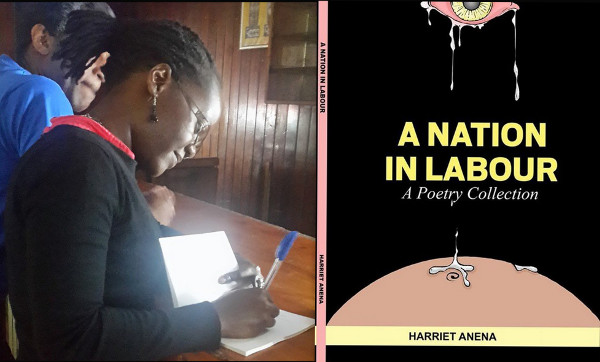1. Kampala writes Bremen: For about three weeks now, writers and literature enthusiast have been exchanging ideas on writing, their writing processes, the writing scenes in Kampala and Bremen on Bremen & Kampala: Spaces of Transcultural writing. It’s really amazing how much you can learn when you open your mind and listen to other people’s experiences. Do check out the blog and read about other writers’ writing routines, reading and writing prose, writing and public life, and different writers’ thoughts on writing, literature and life.
Have a look at my input on making a living from writing and let us know if you are making money from your writing, how you are doing it and how you charge for your work.
2. On the same blog, I talked about my writing group and what impact they have had on my reading and my writing. As if I could not get any more inspired by them, Harriet Anena (journalist, poet, short story writer), went ahead and published her very first collection of poems.
A Nation In Labour has been described as, “….a mature selection by a seasoned poet who enjoys her work and displays all the mastery of a wordsmith for whom words and lines of poetry are tools of the trade that don’t intimidate her“. I believe those words because they are the words of Professor Laban Erapu. Yes, that Laban Erapu whose poems raised us!
To get a copy for yourself, call 0781412975 for delivery within the CBD or try the Femrite offices on Kira road. In Gulu, you can get a copy at Favor FM and Nothern Uganda Media Club offices.

Look out for a review of the book and a chat with the author here.
3. Kenyan Blogger, James Murua has done us all a favour and compiled the 2015 African literary festivals. Save the dates. If you’re in Kampala there are four festivals to look forward to: The Writivism Festival (June 18-22), BN Poetry Festival (August 5-7), Storymoja Festival (September 16-20) and The 2015 Kampala Writers’ Festival (October 6-12).
More details on each of the festival, here.
4. As writers, we often ask ourselves what kind of stories we need to write/ what kind of stories need to be told/ what stories do we need to read as readers. This is Alex Ikawah’s take on the stories we need to tell:
The lack of local content in the market has given foreign stories and content a foothold in the local market that will not only prove hard to shake, but that if not shaken will transform local tastes and expectations in favour of foreign content and make it even more difficult for local content to gain the approval and acceptance of audiences. It is not because these stories are told better but because stories based on our own culture are simply unable to compete. Writers, filmmakers, publishers, and distributors will have to understand that local content needs help. Only a conscious and targeted effort to put these stories in the hands of local viewers will have any chance of success. More here: The Stories We Need To Tell
5. I have suggested before that reading challenges are a great way to get yourself to read books that you would otherwise never read. Personally, I am trying out Sci-Fi/Fantasy/Magical realism, a genre that I have never really had interest in. Kinna Reads is hosting an Africa Reading Challenge that some of you may be find interesting. Follow this link for details.
6. If you interested in fantasy, you will be happy to learn that African literary blog, Brittle Paper launched an African Fantasy Story Series. Here is In the Shadow of Iyanibi, Part 1 and Part 2 by Eugene Odogwu and why the author chooses fantasy over realism.
7. I’ll leave you with Aleya Kassam’s In Your Thirties.
Shame is a controlling animal. It demands. Don’t be fully you. Be less.
It will strike you as odd, how this message of shame is often enforced by women. This will niggle at your brain, and you will pick at it, like a toothpick probing at the bright orange mango stuck in between your teeth. You will talk about it with your mum, hands cupping hot mugs of masala chai, deeply inhaling the familiar comfort of cardamom. You will realise, women have taken this role on, the education of shame, as a survival mechanism. They know that women have to look out for women, teach girls how to behave in a man’s world. Shame is self-defense. More of In Your Thirties.
I hope the rest of your week is wonderful!
